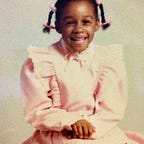We Are Not Our Ancestors’ Wildest Dreams. We are our Ancestors.
What we remember as the past cannot actually be “past” because we are continuously making and remaking that story.
When I was a child, I felt that I was always at the whims and mercies of the adults around me, pushed and pulled and prodded and poked with very little agency. I sought out clandestine ways to exercise autonomy wherever I could: hiding medicine under my tongue until I could get to the bathroom to spit it out; wearing green socks instead of pink to ballet, hoping no one noticed; drawing the water for a bath and sitting on the edge the entire time, kicking the water now and again to simulate splashes. Even given these little moments of autonomy, my overall sense was of powerlessness. All I could do was pretend to take a bath.
To the extent that my own children today feel they are being worked on like pieces of clay, they, too, find ways to be subversive: sitting on the edge of the chair when I say “sit down,” hoping she won’t topple over; eating the tippy-top of the broccoli spear when I say, “eat your vegetables;” using the littlest bit of soap when I say, “take a shower.”
I could be angry, seeing their resistance as defiance. But I smile to myself, seeing these moments of autonomy as moments of power much like the ones I savored. In those moments, rather than feeling defeat as a parent, I breathe. Rather than strike back to enforce my dominance, I watch.
Witnessing their fight, I’m able to reinterpret my own past, my history. Through their exertion of their autonomy, I see myself as powerful, recalling those moments when I too resisted. Their power allows me to see my own. Rather than power running forward, it’s twisted and turned and found its way to the past.
We tend to think of history, or the “past,” as a period on the left-hand side of a linear and coherent timeline that progresses neatly into the future. And this concept of linear time pervades our discussions of Black History.
We split our existence into neat periods:
Enslavement
Reconstruction
Jim and Jane Crow
the Civil Rights Movement
the War on Drugs and mass incarceration
the so-called post-raciality of the first Black President
and, today, Madam Vice President of the United States.
We go on to place people and events on that linear timeline, and once there we leave them and speak of them as if they are static, over, “in the past.”
When we then ask ourselves, Why is our history powerful? we search on the left hand side of the timeline for stories of resistance and bravery and conviction so that we might be resistant and be brave and live with conviction.
We act as if our power only drives from the past.
This linear conception of time is a fiction. Advances in science show that time is not linear and our history is not in the past. Of course, we have the moment of our birth that cannot be reclaimed, and the moment of death which marks the end of living in the corporeal body. But in between, we create time as a construct around which we organize important parts of our lives. We remember some things and forget others, and those things that we remember form our history, our stories, our understanding of who we are today. It is in our remembrance that we give those experiences power to push us forward as we interpret them to tell the story of our present. And the stories we tell ourselves about our “now” give us power to interpret the “past” as to see how it will all fit into our “future.”
“History” is not something in our past. It is necessarily right now.
We misunderstand the power of our history when we imagine our stories as contained in conveniently neat boxes of the “past”, slowly marching forward in time. What could we gain by having a more capacious view of the timeline of our stories, to feel them not as times gone by but as a constant and ongoing creating and changing and morphing, power as energy moving from the past to the future back to the present? How could we experience and re-experience our history such that what we remember as the past cannot actually be “past” because we are continuously making and remaking that story?
In their little acts of defiance, my children taught me something I did not know about myself. Their power empowered me. It nuanced and changed how I saw myself. Not myself as me, almost 40, mother of three, wife, professor, activist, artist, writer. But myself as a little girl, who felt powerless. My children taught me about my history. Their power allowed me to rewrite my history.
I am continually awed and amazed by what our people, Black people, have done. But our history is not over. Every day, it is as if it’s just begun. The power of Black History and the power arising from it is not in the “past” and thus separated on a neat timeline and divorced from the “present.” We must be able to look at ourselves, in our vision of the now, to see how the power we are exerting over our Black lives is the same power as the power in the past, and to use that power to reimagine and reinterpret our Black past as we also imagine our Black future.
But we are not our ancestors’ wildest dreams. We ARE our ancestors.
